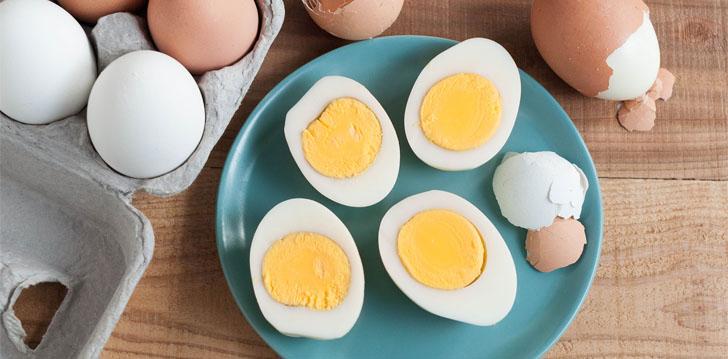
Any time another food report comes out, eggs could one day become a food you should reject but then be touted a super food the next. There’s no doubt that they’re a good source of nutrition and can be worked into a healthful daily diet. But then there’s the black mark on their reputation: cholesterol. Eggs do lose some of their water-soluble B vitamins when they’re boiled, but their cholesterol content stays the same.
Cholesterol Basics
Cholesterol is needed to make hormones, produce vitamin D and digest fats. It also forms the structure that supports every cell in your body. In other words, cholesterol is essential, but you don’t need to get it in your diet because your body makes plenty to meet its needs. Structures called lipoproteins carry cholesterol through your bloodstream. One type of lipoprotein -- high-density lipoprotein or HDL -- collects excess cholesterol and takes it to the liver where it's processed. A second type of lipoprotein -- low-density lipoprotein or LDL -- carries cholesterol that can end-up stuck to your arteries and over time may block the flow of blood.
Cholesterol Content
One large egg has 5 grams of total fat, which is only 45 calories from fat. Your daily diet could accommodate that amount, as long as you don’t get more than 25 to 35 percent of your total daily calories from fat in other foods. It’s more difficult, however, to not exceed the daily recommended limit of cholesterol after eating one egg. Guidelines from the American Heart Association recommend eating no more than 300 milligrams of cholesterol daily. One large egg has 186 milligrams of cholesterol, which is approximately 62 percent of your total daily cholesterol. When it’s hard-boiled, or even poached, the egg retains the same amount of cholesterol.
Egg Yolks
You can eliminate all of the cholesterol from a boiled egg by discarding the egg yolk. Getting rid of the yolk also reduces the calories by 76 percent. But you’ll lose beneficial nutrients too, because the egg yolks contain vitamins A, D and E. The yolk also has 90 percent or more of the egg’s iron, zinc, folate and vitamins B-6 and B-12. The egg white and yolk each contribute about equal amounts of complete protein, so you’ll cut the egg's total protein of 6 grams in half if you eat only the egg white.
Considerations
Low-density lipoproteins increase your risk of clogged arteries, but high-density lipoproteins are associated with a lower risk of cardiovascular disease. That’s why LDL is called “bad cholesterol” and HDL is the “good cholesterol.” While you should limit your daily intake of cholesterol, research suggests that other dietary fats, specifically saturated and trans fats, are bigger health concerns. Some people are more sensitive to cholesterol, but for most people, dietary cholesterol has a small impact on total cholesterol levels, according to the Harvard School of Public Health.
 Any time another food report comes out, eggs could one day become a food you should reject but then be touted a super food the next. There’s no doubt that they’re a good source of nutrition and can be worked into a healthful daily diet. But then there’s the black mark on their reputation: cholesterol. Eggs do lose some of their water-soluble B vitamins when they’re boiled, but their cholesterol content stays the same.
Any time another food report comes out, eggs could one day become a food you should reject but then be touted a super food the next. There’s no doubt that they’re a good source of nutrition and can be worked into a healthful daily diet. But then there’s the black mark on their reputation: cholesterol. Eggs do lose some of their water-soluble B vitamins when they’re boiled, but their cholesterol content stays the same.